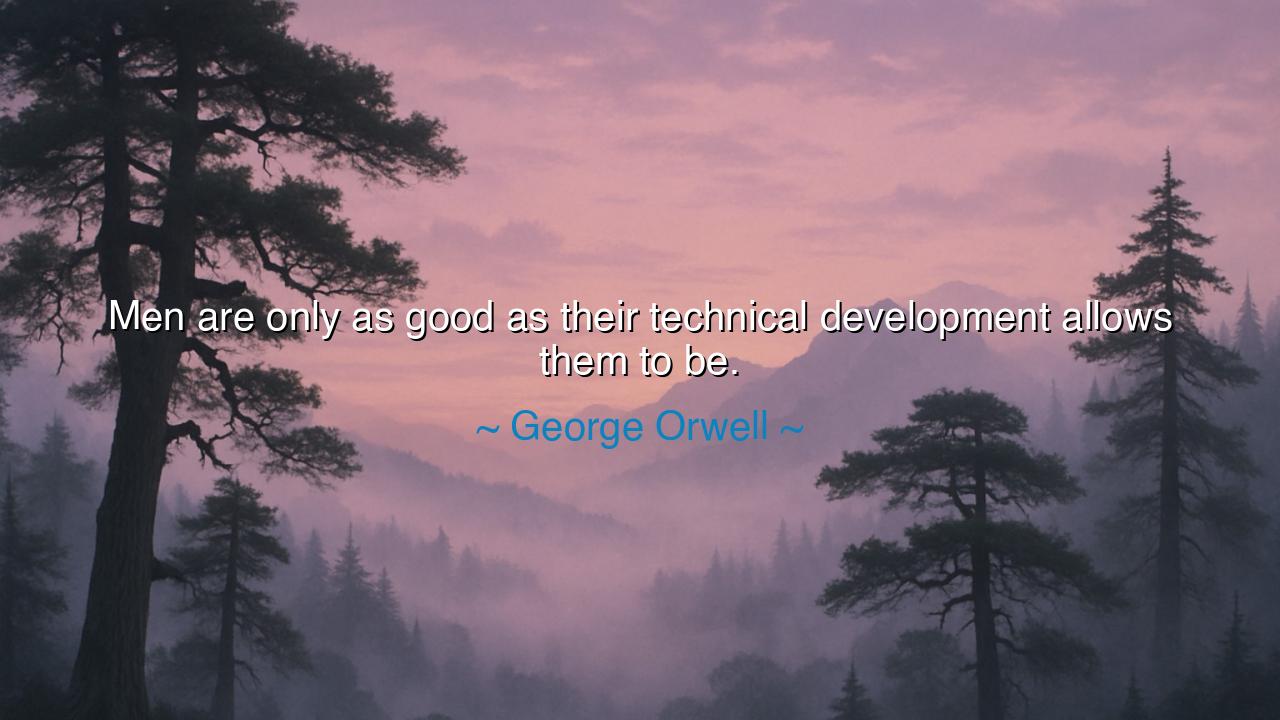
Men are only as good as their technical development allows them






Hear these words of George Orwell, seer of human nature and critic of tyrants: “Men are only as good as their technical development allows them to be.” At first, this saying may strike the ear with coldness, as though man’s virtue were chained only to his tools. Yet look deeper, and behold the truth—our power to do good, our ability to lift burdens and extend justice, is bound not merely to our hearts but also to the instruments fashioned by our hands. For the spirit may be noble, yet without the means to act, nobility remains a dream.
What is meant by technical development? It is the progress of tools, of machines, of knowledge that extends the reach of human will. A man with nothing but bare hands may long to feed the hungry, but cannot nourish thousands without the plow, the oven, the ship. A nation may dream of freedom, but cannot defend itself without the press to spread truth, or the telegraph to rally hearts. Orwell’s saying reminds us that virtue must be clothed in ability; that the desire for good is not enough, unless it is wedded to the power to accomplish it.
History provides a striking mirror in the tale of Gutenberg. Before his printing press, wisdom was bound to the hands of scribes, and truth lay hidden within monasteries, far from the common people. Men might have longed for enlightenment, yet their goodness was limited by what their world allowed. But with the birth of movable type, knowledge spread like fire across Europe. The Reformation, the rise of science, the awakening of conscience—all were fruits borne of this one leap in technical development. Humanity’s moral horizon widened because their tools gave them the power to live their ideals.
Yet this truth bears a double edge. For the same instruments that empower goodness may also magnify evil. Consider the twentieth century, when Orwell himself lived. The radio and cinema, wonders of technical development, could have been vessels of education and harmony, but in the hands of tyrants they became weapons of propaganda, binding nations into the madness of war. Thus, while our goodness may be enabled by our tools, it is also tested by them. The hammer can build a house or break a skull; the machine can free men from toil or chain them in factories.
Therefore, O listener, take heed. Let not Orwell’s words lead you to despair, as though man were only the servant of machines. Rather, understand them as a call to responsibility: the higher our technical development, the greater the demand for wisdom, restraint, and justice. To possess mighty tools but lack virtue is to summon ruin; to join virtue with advancement is to uplift all humanity. The plow must serve hunger, not greed; the pen must serve truth, not lies; the engine must serve life, not death.
Consider, too, the story of Florence Nightingale, who walked the fields of war with nothing but compassion and rudimentary instruments of care. Her heart was noble, yet her hands were bound by the limits of medicine. Still, she strove to reform hospitals, to bring sanitation, to demand progress in technical development so that mercy could be more than a whisper in the dark. Her work birthed modern nursing, proving that when tools of healing advance, human goodness may spread further than ever before.
Thus the lesson is clear: man’s heart and man’s hand must march together. Seek not only to be good in spirit, but also to grow in skill, in knowledge, in power rightly used. Invest in the crafts that extend compassion; learn the sciences that guard life; create the arts that inspire truth. For as Orwell declared, our goodness is not measured by intentions alone, but by the deeds we can perform—and those deeds rise or fall with the strength of the instruments we command.
So remember, O child of tomorrow: men are only as good as their technical development allows them to be. Therefore, strive to advance not only machines but also the soul that guides them. For the plow without the heart is tyranny, but the plow with the heart is abundance. The pen without conscience is poison, but the pen with conscience is liberation. In this harmony of spirit and skill lies the true destiny of mankind.






AAdministratorAdministrator
Welcome, honored guests. Please leave a comment, we will respond soon